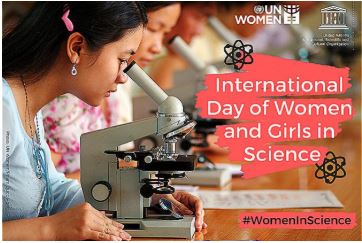The United Nations have proclaimed 11 February the International Day of Women and Girls in Science aiming to inspire and engage women and girls in science and STEM education. It is still widely the case, unfortunately, that women and girls are excluded from participating fully in science.
According to the article from the UN “At present, less than 30 per cent of researchers worldwide are women. According to UNESCO data (2014 - 2016), only around 30 per cent of all female students select STEM-related fields in higher education. Globally, female students’ enrolment is particularly low in ICT (3 per cent), natural science, mathematics and statistics (5 per cent) and in engineering, manufacturing and construction (8 per cent).”
In an article from the Shool of Education “Helping Girls Succed in STEM” it presented that “One of the main reasons for gender disparities in STEM subjects has to do with a long-held stereotype. It was thought that boys were “better” at math and science, while girls were encouraged to pursue literature or the arts. As a result, women today only hold 25% of all STEM jobs in the U.S. White males held 49% of all science and engineering jobs in 2015, according to a report published by the National Science Foundation.” To read the full article please click here.
In another article from the Maryville University “Women in STEM” there are better news regarding women in STEM due to “growing awareness of the challenges women and girls face in these important fields. Universities, professional associations, and tech industries are redoubling their efforts to encourage women and girls to study science and technology subjects and to pursue careers in STEM.” The article also discusess the findings of Sarah Rugheimer on gender bias in STEM, how to support women and girls in STEM, the bright career outlook for women in STEM and the women who lead the STEM field, and how they got there. To read the full article please click here.
Other interesting resources to read are:
The University of Central Florida, 5 STEM Space Activities, Resources and Lessons for Students and Educators
Ohio University, K-12 STEM Lesson Plan Guide
Source: UN, School of Education, Maryville University

